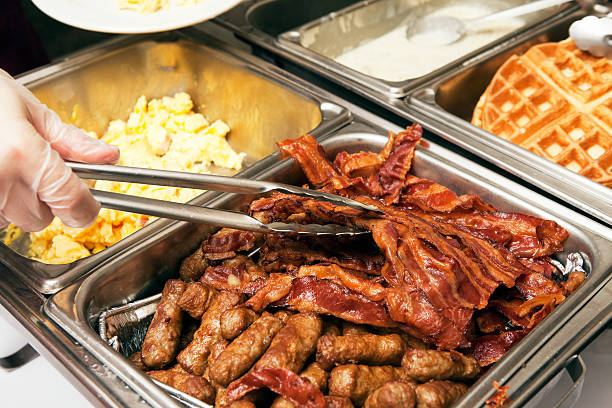When you wake up in an unfamiliar place, the last thing on your mind should be where to find your first meal of the day. That’s precisely why hotel breakfast buffets are a godsend for travelers. They eliminate the need for breakfast planning and make it easy to satiate your morning hunger. However, there’s another aspect of dining etiquette to consider – avoiding the unintended rudeness that can occur when you’re trying to be polite at a buffet.
We’ve all been guilty of committing a few buffet faux pas, whether it’s at a complimentary hotel breakfast buffet or another dining establishment. Let’s explore five actions you might think are polite but are, in fact, less considerate to fellow diners.
1. The Waffle Dilemma
You might believe you’re doing everyone a favor by prepping the waffle iron for the next guest, but this can lead to unexpected issues. Leaving waffle batter in the iron may not align with the preferences of the person behind you in line. They might have their unique way of preparing waffles.
Moreover, if there’s no one in line behind you, the subsequent guest who encounters your abandoned waffle iron may be in for a less-than-pleasant surprise – a charred, inedible mess. Inadvertently, your well-intentioned act creates more work for other customers or staff who must clean up the mess.
If the joy of preparing breakfast for others brings you happiness, consider politely offering to make a waffle for a fellow diner. You might just make a new friend in the process.
2. The Plate Predicament
At many buffets, you’ll find a sign urging guests to use a clean plate each time they visit. This rule isn’t arbitrary; it serves an essential purpose. Unlike a casual buffet at home, commercial buffets operate differently. While at home, you may have a limited supply of dishes and hands for washing, commercial kitchens don’t face the same constraints. However, they do contend with larger concerns, such as cross-contamination and foodborne illnesses, which can result from customers reusing plates.
Unbeknownst to most, when serving or receiving food at a buffet, the serving utensils sometimes touch the plate’s surface. If the plate is clean, there’s little cause for concern. However, if the plate carries traces of food that have come into contact with utensils in someone’s mouth, it poses a significant health risk.
3. The Food ‘Fixer’ Fantasy
Imagine this scenario: You’re navigating a buffet, plate in hand, and you come across a tray of French fries lacking seasoning. Instinctively, you reach for a salt shaker to enhance the flavor. Alternatively, you encounter a pot of oatmeal with an unappetizing film on top, so you skim it off and discreetly deposit it on an adjacent plate, sparing fellow diners the displeasure of encountering unpleasant oatmeal.
While your intentions might seem noble, it’s not your role to alter the food at a buffet. Firstly, your perception of what constitutes proper seasoning may not align with everyone’s taste. More importantly, tampering excessively with buffet food can lead to the spread of illnesses. If you spot any culinary issues, it’s best to alert a staff member.
4. The Impromptu Chef Act
Buffets can sometimes disappoint with subpar or monotonous food options. Yet, no matter how dire the situation seems or how inventive you fancy yourself in the kitchen, a buffet is not the place to unleash your inner chef.
Playing chef at a buffet involves concocting dishes by combining various elements available. You might attempt to enhance French toast by stuffing it with homemade strawberry cream cheese, sprinkling sugar, and running it through a toaster oven. However, this practice can unleash chaos. Your culinary experiment may lead to equipment malfunction or inspire others to try their own unique creations, resulting in a chaotic dining area and irritated staff.
If you find yourself with limited appetizing options, it’s best to inquire if the kitchen can prepare something to your liking rather than attempting to showcase your culinary skills at a waffle iron.
5. The Coffee Conundrum
Few things are as disappointing as discovering an empty coffee pot at a hotel breakfast buffet. However, volunteering to make coffee for everyone, even if you’re a seasoned barista, isn’t always the solution.
For starters, not all coffee makers operate the same way, and you might not be familiar with the specific model. Additionally, hotels and restaurants often have their preferred methods for making coffee that guests have come to expect. Altering this process can result in wasted coffee.
Furthermore, you may not accurately gauge the required quantity of coffee for the morning. Staff members are typically better equipped to estimate the number of customers they’ll be serving. Instead of attempting to make coffee independently, it’s advisable to leave this task to an employee who can ensure a safe and hygienic preparation process, ensuring everyone can enjoy their coffee without disruptions.
